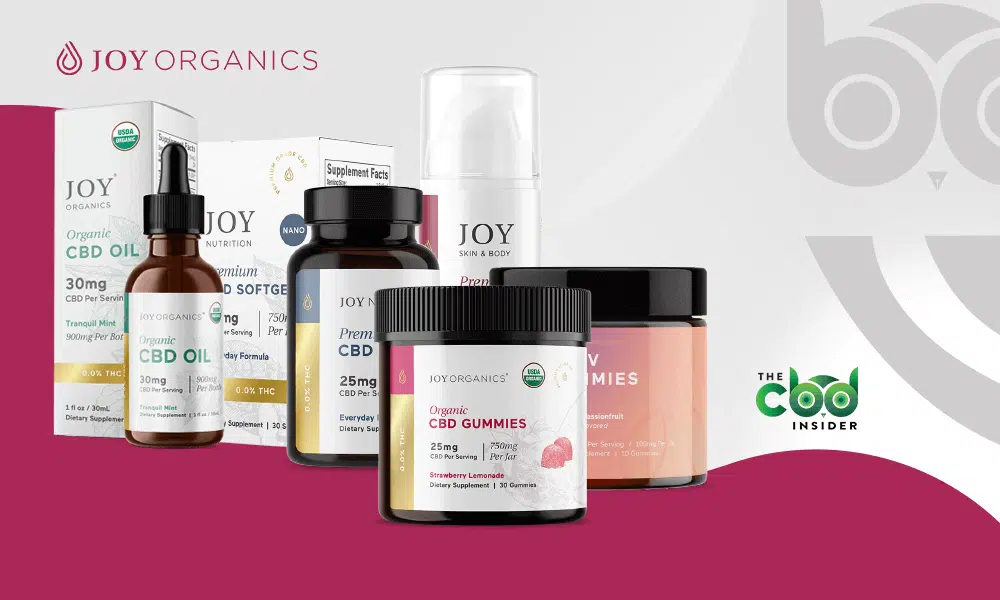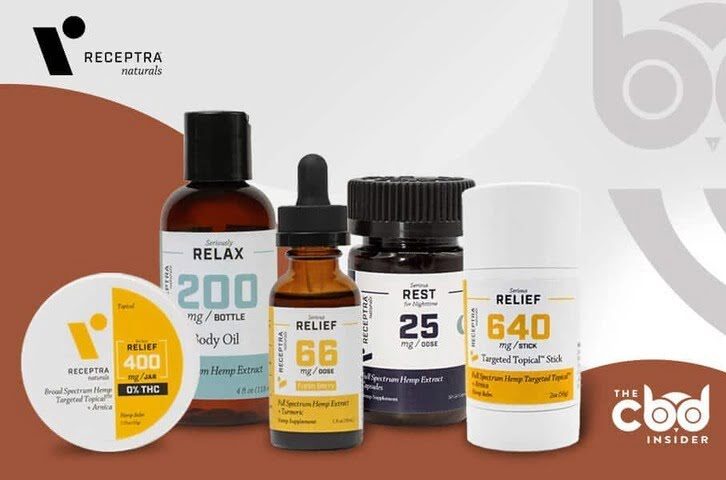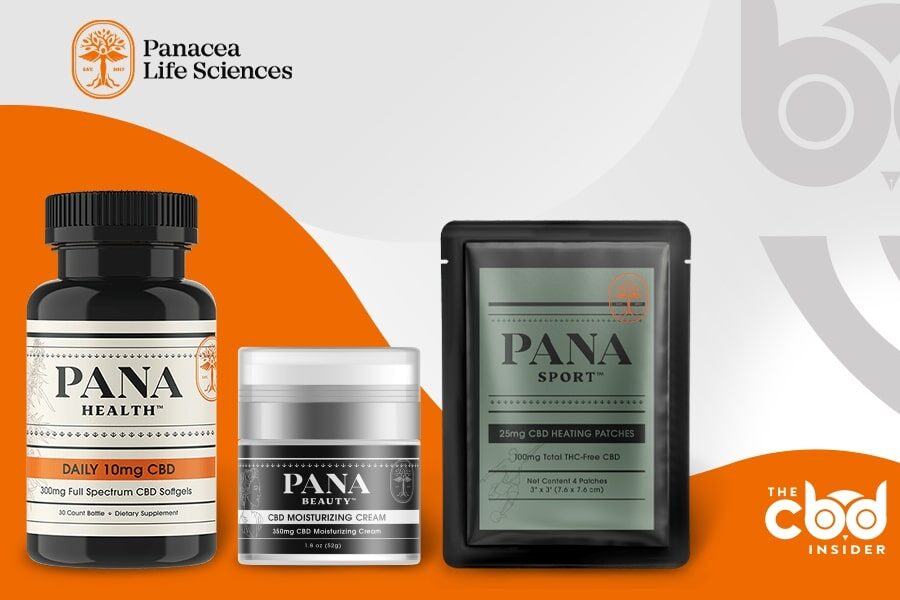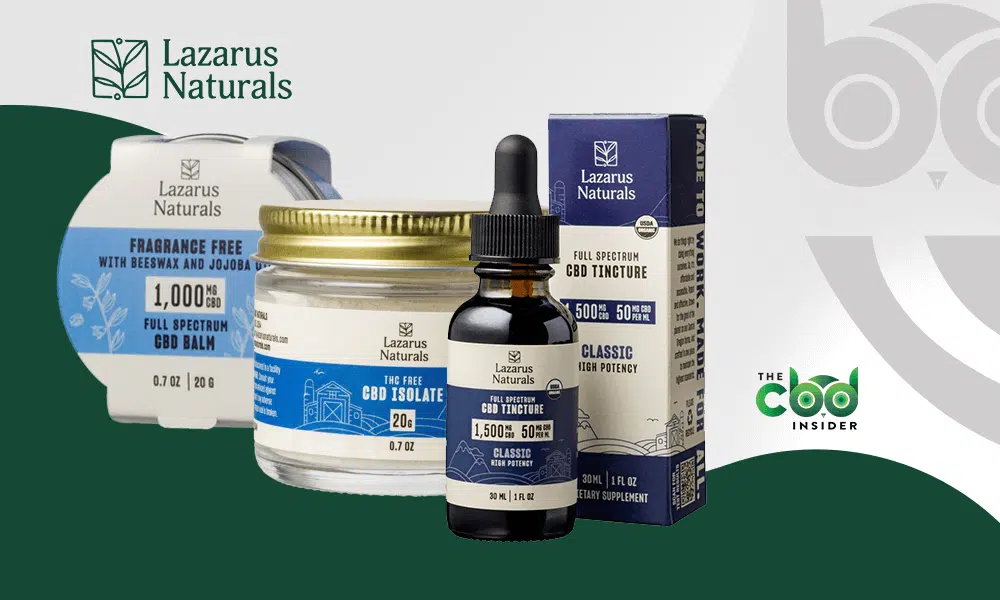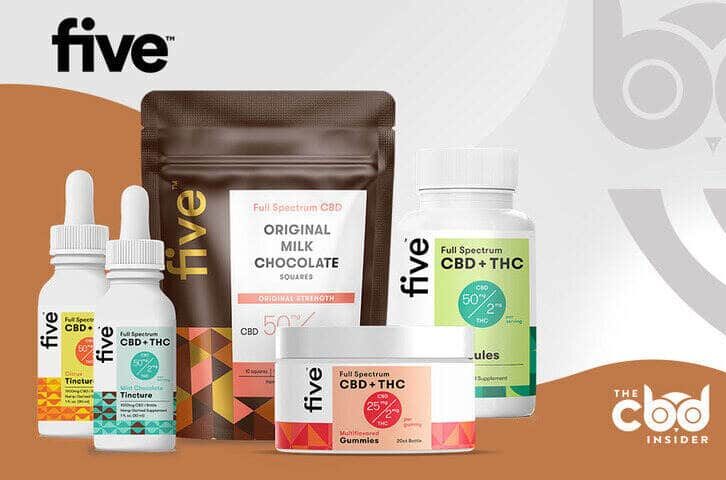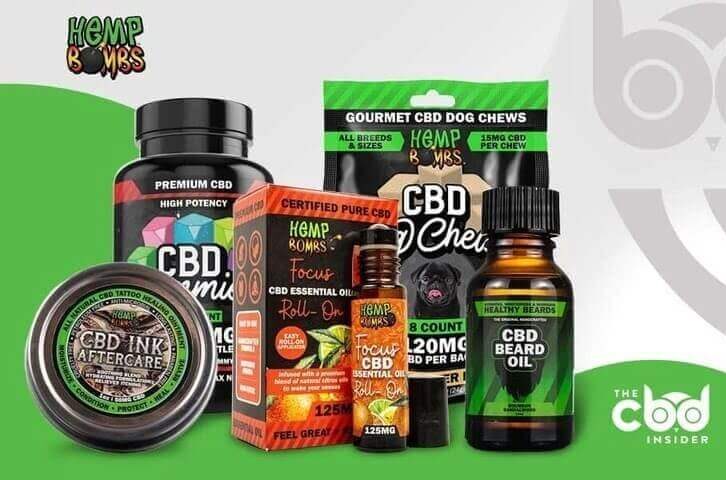-
- Market Research
- |
- CBD Near Me
- |
- Giveaways
- |
- Newsletter
- |
- Contact
- |
- Advertise
- |
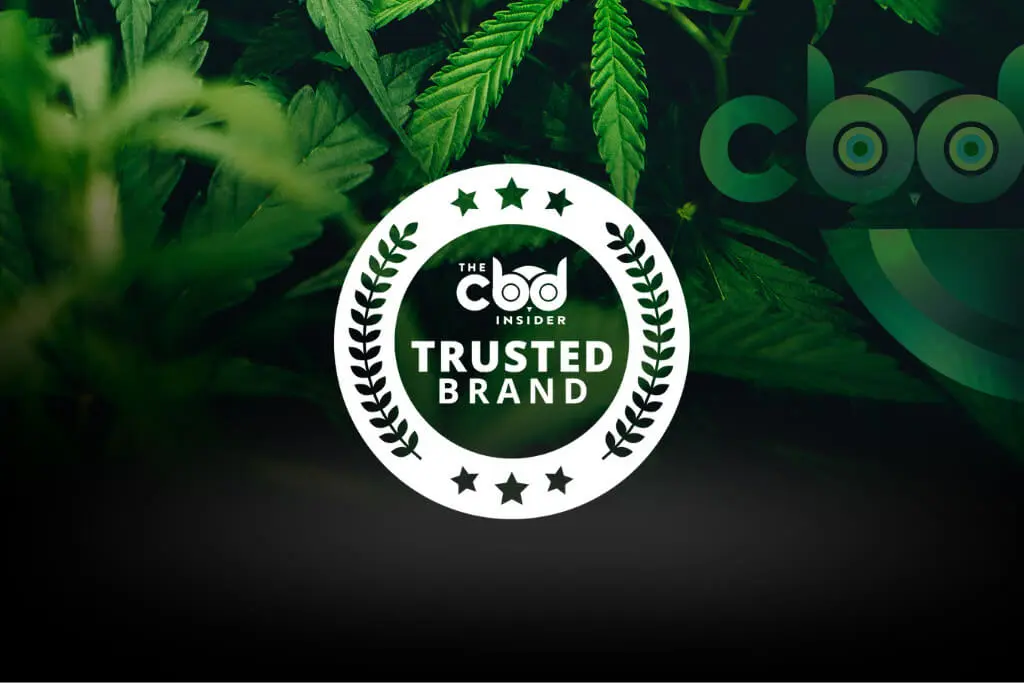
In order to provide as comprehensive a review as possible of a CBD brand’s overall value, we take into account many factors beyond product quality and price when reviewing new brands.
This is why, in addition to interviewing the brands directly, we personally test as many of their customer-facing systems as possible, including customer service, the online checkout process, and of course, the products themselves.
On a broader scale, we also factor in each CBD brand’s contribution to the CBD industry and the world, including research involvement, philanthropic efforts, and more.
Each of the 27 criteria used in our rating system is scored out of 100 points, and the resulting score is weighted between 2.5% (2.5 points) and 7.5% (7.5 points) of the 100 total points.
For example, a score of 50 on the “Hemp Quality and Sourcing” criterion (weighted at 5%) will contribute 2.5 points toward the overall score.
Here’s a more detailed breakdown of the criteria we use to review brands.
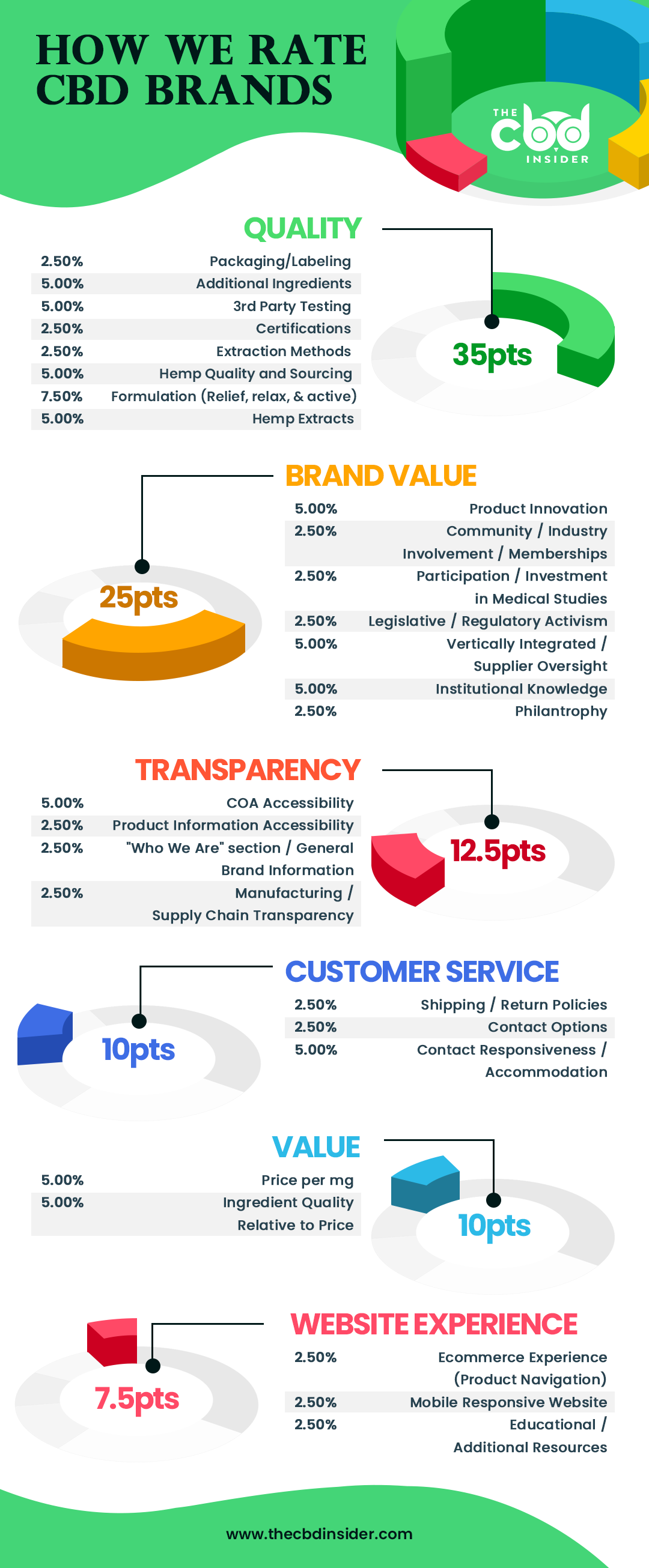
Quality – 35 Points
Anything that can affect end product quality belongs in this category, including how the CBD was sourced and extracted, certifications and testing standards upheld by the brand, packaging integrity, and more.
Packaging/Labeling
Weight = 2.5%
Both the structural integrity of the packaging and the breadth and depth of information provided thereon are key to scoring well on this criteria.
Specifically, we’re looking for unbroken seals and tightly fitting lids, proper tinting of glass bottles where applicable, and a beginner-friendly, yet thorough introduction to the product.
Additional Ingredients
Weight = 5%
Points are awarded for the use of natural bioenhancers, plant-based alternatives to unhealthy sweeteners/flavors, and supporting ingredients that promote a specialized purpose (e.g., melatonin for sleep).
Points are taken away for the use of corn syrup, preservatives, and other undesirable ingredients.
Third-Party Testing
Weight = 5%
This criteria refers to the practice of having a non-affiliated laboratory test your brand’s CBD for cannabinoid density, residual solvents, heavy metals, and more.
Points are awarded for full-panel testing reports and ISO 17025 certification (held by the lab).
Points are taken away for failing to meet these standards, either on the lab accreditation front or the clear and accurate reporting front.
Certifications
Weight = 2.5%
Among the more prestigious certifications that CBD brands can receive include U.S. Hemp Authority and Good Manufacturing Practices (GMP).
As with other industries, these certifications and others indicate a brand’s compliance with industry-leading safety and efficiency standards.
We take into account both the number of certifications and their exclusivity/difficulty level when rating brands across this criteria.
Extraction Methods
Weight = 2.5%
There are multiple ways to extract cannabidiol from the hemp plant, but in every case, it requires the use of a chemical solvent that needs to be removed from the CBD/solvent mixture after it has done its job.
CO2 is considered the safest and most effective extraction method because it can be easily removed from extracts, minimizing the amount of residual solvent.
As such, we award full points for CO2, and deduct points for other methods according to safety (ethanol scores fairly high, butane definitely does not).
Hemp Quality and Sourcing
Weight = 5%
Many dynamics can affect scoring of this criteria, including consistency (sourcing from the same growers), organic certification, level of oversight, and the type of strains used by growers.
We award points for USDA-certified organic hemp grown specifically for CBD extraction, also taking into account the standards set by CBD brands when establishing partnerships.
These standards should include at the minimum: industrial hemp compliance (0.3% THC content by dry weight), certificate of origin, and certificate of analysis.
Formulation (Relief, Relax, and Active)
Weight = 7.5%
In addition to the quality of any single CBD product formulation, which we assess using certificates of analysis and interviews with formulators, we require a brand to provide some permutation of “relief,” “relax,” and “active” formulations to receive full points.
Furthermore, if a “relax” formulation, for example, doesn’t contain an evidence-based support ingredient like melatonin or cannabinol (CBN), we don’t count it.
Hemp Extracts
Weight = 5%
In this instance, we’re referring to three types of extracts: full-spectrum, broad-spectrum, and isolate.
If a brand offers all three of these extracts, they receive full points, and deductions are scaled according to how popular the missing extract types are.
Transparency – 12.5 Points
Legitimacy and transparency go hand in hand, CBD or otherwise.
We want to ensure that customers are provided with all the information they need to make an informed purchase.
The following subcategories were designed to reward CBD brands who present their lab reports, product info, and other important details in an honest and forthcoming manner.
COA Accessibility
Weight = 5%
When brands get their CBD tested by a third-party lab, they are provided a Certificate of Analysis containing test results.
Since this information is highly pertinent to a smart buying decision, we place heavy emphasis on COA accessibility.
If the COAs are easily accessible on the website, that’s high marks, but if batch-specific reports can be accessed via QR codes on packaging, that’s full marks.
Product Information Accessibility
Weight = 2.5%
The product page is a capricious being. Too much content, and the customer may feel flustered and no longer intent on buying. Too little content, and customers will feel scammed.
We strive for a healthy middle ground that includes all the relevant product specs/info as well as a moderate amount of FAQ or informational resources.
We also reward points for efficient design, because a product page that doesn’t organize content with tabs, clearly delineated sections, etc. can be far less communicative than a well-designed page with the same exact content.
“Who We Are” Section / General Brand Information
Weight = 2.5%
The “Who We Are” or “About Us” page is a chance to build rapport with scam-weary customers; it’s a chance to organically disarm their skepticism by simply telling your story as a brand.
We like to see a balance between storytelling and horn-tooting (listing of credentials, achievements, etc.), and we award points based on how close to the middle a brand is.
With too much storytelling, it will look like the brand is trying to cover something up, but if the page goes too far into the self-promotion aspect, readers will have a hard time differentiating the brand from everyone else.
Manufacturing / Supply Chain Transparency
Weight = 2.5%
From planting to shipping, customers have the right to know where their products came from and where they’ve been.
We award points to brands who clearly and honestly share this information, which should answer the following questions at a minimum:
- Where and by whom was the hemp grown?
- Where, how, and by whom was the cannabidiol extracted from the plant?
- Where was the cannabidiol tested, and which tests were performed?
- Where and by whom was my CBD product formulated?
Website Experience – 7.5 Points
The less you have to consciously think about a website while using it, the better.
These criteria are scored with this philosophy in mind, prioritizing smooth structuring and informative content over cutting-edge design features.
Ecommerce Experience (Product Navigation)
Weight = 2.5%
Using linked product category pages, filters, and high-quality product images, a CBD website should allow you to pull up any product in less than ten seconds.
We also reward points based on how simple and intuitive the checkout process is; if it’s more than three pages, improvements can probably be made.
Finally, each product page should contain enough information to inform a confident purchase, including general product info/specs, reviews, FAQ, etc.
Mobile Responsiveness
Weight = 2.5%
This term refers to how well-adapted a website is for mobile devices.
If we can navigate a CBD brand’s website on our mobile devices without seeing any oversized or off-center images, broken links, or other formatting issues, then the site aces this criteria.
If and when we do encounter responsiveness issues, the deduction is weighted in accordance to how functionally limiting the issue is.
Educational/Additional Resources
Weight = 2.5%
It’s highly important, given the regulatory status and frequent misrepresentation of CBD, that a brand’s website provide educational resources for new customers.
We award points based on the depth and breadth of educational content, which should include pages detailing what CBD is, how it works, how it’s extracted, etc.
Customer Service – 10 Points
These criteria are meant to assess both a brand’s services as well as their accessibility, whether for direct use by customers (support line) or for informative purposes (shipping/return policies).
Shipping / Return Policies
Weight = 2.5%
Points are awarded for the quality and number of partnering carriers (FedEx, UPS, etc.), processing and shipping timeframes, and clearly delineated return policies.
As mentioned, we also factor in how easy or difficult it is for customers to access this information from the homepage.
Contact Options
Weight = 2.5%
If a customer can use one of multiple support channels (phone, messenger, etc.) to reach a human being any time of the day or week, we award full points.
Points are deducted for poorly accessible or insufficient support services (i.e., email only) as well as non-24/7 coverage.
Contact Responsiveness / Accommodation
Weight = 5%
Points are awarded or deducted based on how fast customer service responds to our message or call.
If the problem or question is not resolved outright, we still award points based on how accommodating the specialist is, e.g., offering other resources that may help with the problem.
Value – 10 Points
We designed this category to fairly reconcile the important issues of price and quality.
In other words, if a CBD company runs on the expensive side (price per mg criterion), they can still make up for that deduction with the use of high-quality ingredients and formulations (ingredient quality relative to price criterion).
Price Per Milligram
Weight = 5%
Every year, we poll over a thousand current or prospective CBD consumers about their attitudes towards and usage of CBD, publishing our findings in a CBD consumer report.
One useful application of this data is to help us set a “fair price” across CBD product categories (oil/capsules, topicals, and gummies) based on input from our respondents.
We use these price points as standards to compare different brands against, ranking each brand according to how many pennies-per-milligram over or under the standard(s) their products cost.
Ingredient Quality Relative to Price
Weight = 5%
We award points for natural, cannabinoid-rich, and effective formulations that support specific uses, and we deduct points for the use of artificial ingredients, fillers, and preservatives.
Since this quantity is relative, cheaper products will be rewarded more for high-quality ingredients and penalized less for low-quality ingredients, which is flipped in the case of expensive products.
Brand Value – 25 Points
This set of criteria requires a broader look at how the brand in question is providing value to the CBD industry and the world around them.
We consider product innovation, community and legal activism, research efforts, and philanthropy to be the key drivers behind change of this scope.
Product Innovation
Weight = 5%
Every successful formulation tweak or other change that can be viewed by others in the industry as an opportunity to enhance the effects of CBD is awarded points for innovation.
The brand doesn’t have to completely reinvent CBD products to perform well here; every incremental improvement that improves user experience in some way is taken into account.
Community / Industry Involvement / Memberships
Weight = 2.5%
CBD associations are popping up at the state, regional, and national level, and we award brands for each membership, adding extra points for memberships with strict quality and safety requirements.
We also factor in a brand’s participation in community-wide events, whether that entails speaking engagements, sponsorships, or other forms of involvement.
Participation / Investment in Medical Studies
Weight = 2.5%
Any study led or funded by a CBD brand that adds to the current understanding of CBD in any way is rewarded with points.
We also recognize qualitative studies performed by CBD brands, i.e., consumer surveys, especially if the respondent pool is in the thousands.
Legislative / Regulatory Activism
Weight = 2.5%
This can take many forms, including:
- Spreading awareness of upcoming CBD legislation among customers, email subscribers, and the general public.
- Donating, signing petitions, or otherwise contributing to pro-CBD legislative efforts.
- Networking with other CBD brands to promote pre-regulation safety/quality standards or improve existing standards.
- Lobbying state legislators for improved CBD regulation.
The list goes on and on.
Points are awarded according to how much of an impact each effort makes on the industry.
Vertically Integrated / Supplier Oversight
Weight = 5%
The more hands-on a CBD brand is throughout each step in the life cycle of a CBD product (from planting to shipping), the more value they can provide their customer base in terms of trust and quality assurance.
We award points to CBD brands that partner directly with farms, sharing as much of the manufacturing process as possible with the public.
We also award points for in-house formulation, extraction, testing (in addition to third-party testing), and any other steps of the manufacturing process.
Institutional Knowledge
Weight = 5%
Both the academic insights into the science of CBD product formulation and the business acumen that can only come from a deep understanding of the industry as a whole are rewarded with points.
To measure these forms of knowledge accurately, we consider everything from founder/employee credentials to site content, including interview responses.
Philanthropy
Weight = 2.5%
We open this criterion up to any effort taken by a CBD brand that helps a group of people, CBD-related or otherwise.
In addition to charity events, activism, etc., we also consider first responder and military discounts as philanthropy.
The Final Score
After all 27 criteria have been evaluated, the brand is assigned a score between 0 and 100.
Of course, some things don’t translate well to being assigned a numerical score, but if we think it’s a noteworthy enough detail, we’ll mention it at the end.


